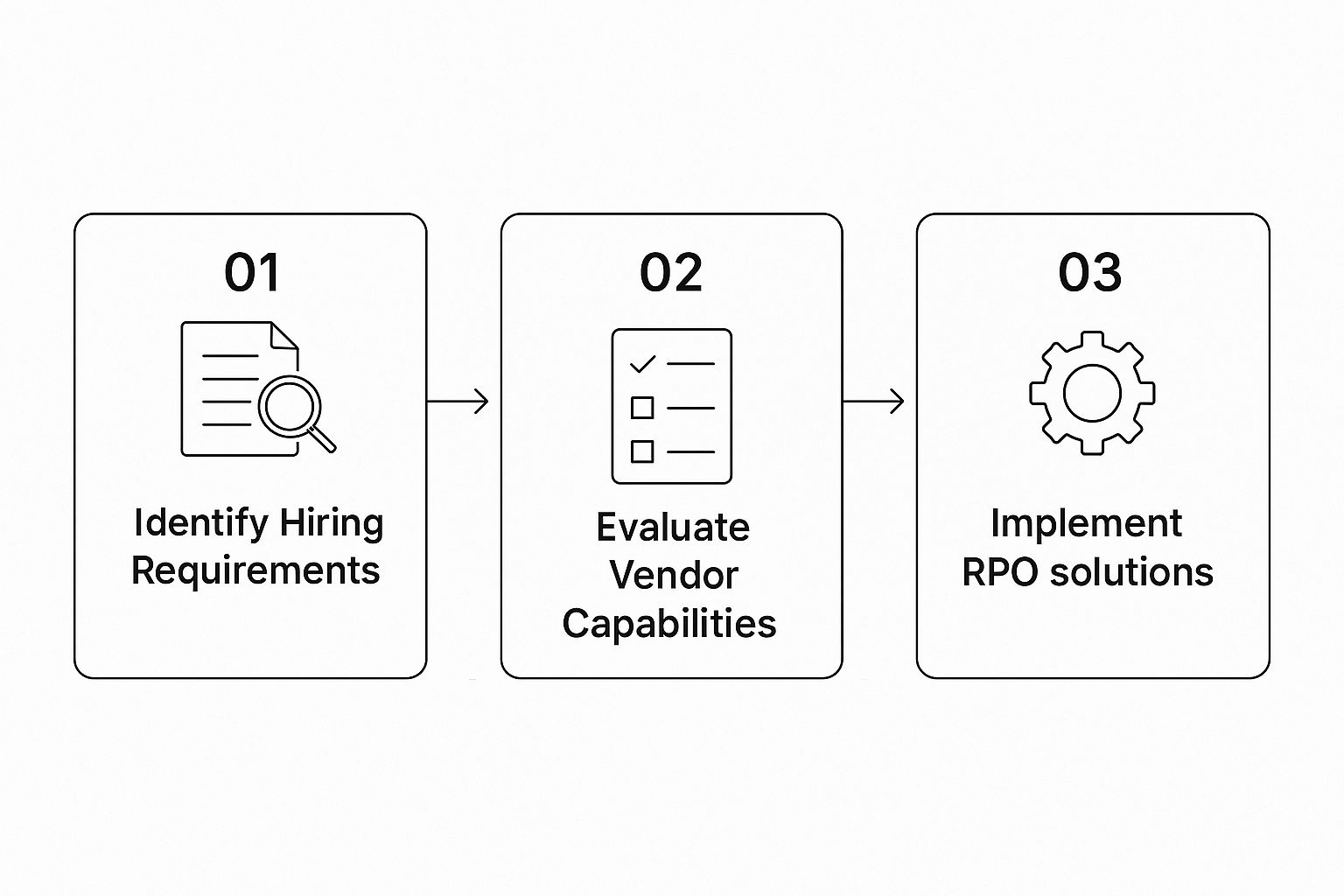So, what exactly is recruitment outsourcing? In simple terms, it's a strategic move where a company hands over some, or even all, of its permanent hiring activities to an external expert.
Think of it less like hiring a temp and more like bringing in a specialist to build and run your entire talent acquisition department. They handle the whole nine yards, from sourcing top candidates to sealing the deal with a job offer.
What Is Recruitment Outsourcing and How Does It Work

Let's use a simple analogy. Picture your company as an orchestra. Your internal HR team is the conductor, expertly managing the day-to-day symphony of employee relations and internal operations. But when you need to find a new, world-class violinist, you bring in a specialized scout who lives and breathes the world of string instruments. That scout is your recruitment outsourcing partner.
This deep, integrated partnership is formally known as Recruitment Process Outsourcing (RPO). It’s a completely different ballgame from just calling a staffing agency. A staffing agency's job is to fill a vacant seat. An RPO provider's mission is to help you build your team for the long haul. They essentially become an extension of your company, learning your culture and representing your brand to attract people who are a genuine fit for your future.
The core idea is simple: You're not just buying a list of candidates. You're embedding a team of recruiting experts into your business to manage, improve, and execute your entire hiring strategy.
Recruitment Outsourcing vs Traditional Staffing Agencies
It's easy to confuse RPO with traditional staffing, but they serve very different purposes. RPO is a long-term, strategic solution designed to transform your entire approach to hiring. The focus is on boosting the quality of new hires, creating a reliable pipeline of future candidates, and helping you hit your big-picture business goals.
This often includes developing specialized strategies, like a robust plan for remote talent acquisition, which is absolutely essential in today's distributed workforce.
To make the distinction crystal clear, here’s a side-by-side comparison:
| Aspect | Recruitment Outsourcing (RPO) | Traditional Staffing Agency |
|---|---|---|
| Relationship | Strategic, long-term partnership embedded within the company. | Transactional, short-term relationship focused on filling individual roles. |
| Scope of Work | Manages the entire recruitment process (or specific parts) from start to finish. | Fills specific, often temporary or contract, job vacancies. |
| Goal | To improve hiring quality, efficiency, and overall business performance. | To quickly place a candidate in an open position. |
| Brand Representation | Acts as an extension of your company, representing your brand and culture. | Operates as a third-party recruiter, representing their own agency. |
| Candidate Ownership | Candidates are hired directly by you; the talent pipeline belongs to you. | Candidates often remain employees of the agency (for temp roles). |
Ultimately, choosing RPO means you're investing in a system, not just a service.
The demand for this kind of expertise is soaring. The global outsourcing market was valued at around $302.62 billion in 2024 and is expected to climb to $525.23 billion by 2030. When you consider that a massive 74% of employers worldwide say they struggle to find skilled talent, it's no surprise that companies are turning to specialists for help.
Here’s what you can expect from a true RPO partnership:
- Strategic Partnership: The provider dives deep to understand your business, your culture, and where you want to go.
- Process Ownership: They take full responsibility for the recruiting lifecycle, from defining the job role to helping with onboarding.
- Brand Representation: Their recruiters become your brand ambassadors, ensuring every candidate has a great experience.
- Scalability: You can easily ramp services up or down depending on your hiring needs, giving you incredible flexibility.
Why Top Companies Outsource Their Hiring
The decision to outsource recruitment is rarely just about saving a few dollars. Smart companies see hiring not as a line item on a budget, but as the very engine that drives their growth. Bringing in a recruitment partner is like adding a team of expert mechanics to that engine—it's about injecting specialized know-how to gain a real competitive advantage. It's a strategic move to build a better, stronger team, and do it faster.
Picture a fast-growing tech startup that suddenly needs to assemble a whole team of AI engineers. Their internal HR folks are great, but they don't have the deep network or the specific technical sourcing skills for such a niche field. This is the perfect spot where outsourcing turns a massive headache into a clear, manageable plan.
Gaining Immediate Access to Expertise and Technology
One of the biggest draws of outsourcing is the instant access you get to a deep pool of talent acquisition knowledge. RPO providers are specialists. They live and breathe recruiting all day, every day. They show up with massive candidate networks, powerful sourcing software, and a ton of market data that most in-house teams just can't match.
This expertise goes way beyond just finding people. By working with an RPO, companies get to adopt the latest strategies and modern talent acquisition best practices without the steep learning curve of building them from scratch. This leads to a better experience for candidates, a stronger employer brand, and, most importantly, higher-quality hires.
RPO turns recruitment from a reactive necessity into a proactive, data-driven function. It’s about leveraging external experts to build the team you need for tomorrow, not just filling the empty seats of today.
This chart from Prialto shows the top reasons businesses choose to outsource various functions.
While the data covers outsourcing in general, the key drivers line up perfectly with recruitment. The big wins are increasing efficiency (70%), letting the core team focus on what they do best (40%), and tapping into specialized skills (20%).
Enhancing Scalability and Business Agility
Business needs are always in flux. One quarter, you might need to hire 50 new salespeople for a product launch. The next, hiring might go on hold while you focus on internal training. An in-house recruiting team can really struggle with these kinds of swings. You're either swamped and falling behind during growth spurts or overstaffed and idle during the lulls.
Recruitment outsourcing smooths out those peaks and valleys by offering incredible flexibility. An RPO partner can ramp their team up or scale it back down based on your immediate needs, making sure you always have the right amount of recruiting firepower. This agility helps companies:
- Accelerate Growth: Quickly staff up for new projects or expand into new markets.
- Manage Costs: Avoid the heavy, fixed overhead of a large, permanent recruiting team.
- Respond to Market Changes: Adjust hiring speed without throwing your core business off track.
This kind of strategic flexibility is a game-changer. It frees up your leadership to focus on their main jobs, knowing that the talent pipeline is in the hands of experts who can pivot as quickly as the business does. The result is a more resilient, efficient, and growth-ready organization.
Finding the Right RPO Model for Your Business

Knowing what recruitment outsourcing is doesn't mean you automatically know how to use it. RPO isn't a one-size-fits-all solution; you can't use the same blueprint for every company's hiring needs. The real trick is finding a model that clicks with your company’s unique hiring rhythm, budget, and where you want to be in a few years.
Think of it like getting in shape. Are you looking for a full-time personal trainer to completely reshape your lifestyle? Or maybe a specialized coach to prep you for a single event? Or perhaps you just need an expert you can call on every now and then for guidance. Each option requires a different scope and commitment, and RPO models are no different.
The RPO market itself has become incredibly flexible. Even with the bumpy economic conditions of 2024, providers have leaned into offering more tailored, tech-savvy services. This means a bigger focus on skills-based hiring and using AI to solve workforce puzzles, turning RPO from a simple service into a strategic partnership. You can dive deeper into these trends and learn how the RPO market is adapting to new challenges.
End-to-End RPO
This is the all-in-one package—basically, the full-time personal trainer. With an End-to-End RPO model, you hand over your entire permanent hiring operation to a single partner. They handle everything from the ground up: workforce planning, writing job descriptions, sourcing candidates, screening, interviewing, and even getting new hires onboarded.
This approach is a perfect fit for companies that are always hiring or those that need to completely overhaul their talent acquisition strategy for the long haul. It's a true, deep-seated partnership.
Project-Based RPO
Now, let's say you're training for one specific marathon. You don’t need a coach for the whole year, just an expert for a set amount of time. That's Project-Based RPO in a nutshell. This model shines when you have a specific, time-sensitive hiring goal.
You might use this when you're:
- Launching a new product and need to build a sales team of 30 people.
- Opening a brand-new office or facility in another city.
- Trying to quickly fill several roles that require a niche skill, like data science.
With Project-Based RPO, you get a dedicated team of experts focused on a clear objective with a defined start and end date. It provides targeted firepower exactly when you need it most without a long-term commitment.
On-Demand RPO
Finally, we have On-Demand RPO. Think of this as your drop-in fitness class—a flexible, scalable solution for when you just need an extra pair of hands. Your internal team might be fantastic but completely swamped, or maybe you need some specialized sourcing help for a tough-to-fill executive role.
On-Demand RPO lets you bring in a single recruiter or a small team for a few hours a week or to tackle a specific task. This model gives you incredible agility, allowing you to ramp your recruiting power up or down on a dime to match demand. It's a smart, cost-effective choice for smaller businesses or any team dealing with a temporary spike in their workload.
What to Expect from Your RPO Partnership
Bringing on an RPO partner isn't just about handing off a to-do list; it’s about forging a true partnership to build a talent-attraction machine. The entire process is a carefully mapped-out journey, designed from the start to mesh the RPO provider's expertise with your unique business goals. This ensures everything runs smoothly and effectively right out of the gate.
Understanding this journey pulls back the curtain on what happens behind the scenes. It’s a step-by-step process that starts with big-picture strategy and moves into hands-on execution and, finally, constant refinement.
This visual gives a bird's-eye view of the first steps you'll take when kicking off an RPO solution.

As you can see, any successful engagement starts by clearly defining your needs, then moves into choosing the right partner and creating a structured plan to get started.
Phase 1: Discovery and Strategy Design
The journey kicks off with a deep dive into your organization. This is far more than a quick chat. It’s a thorough discovery phase where the RPO team gets to know your company culture, business objectives, and the specific hiring headaches you're facing. They’ll dig into your current processes, pinpoint the bottlenecks, and work with you to define what a "win" actually looks like.
This groundwork results in a recruiting strategy built just for you. Key things you'll walk away with from this phase include:
- Service Level Agreements (SLAs): These are your ground rules. They’re formal agreements that lock in specific metrics and expectations, like time-to-fill, candidate quality benchmarks, and how often you’ll communicate.
- Process Mapping: Think of this as the playbook. It’s a detailed blueprint of the new, streamlined recruitment workflow, making it crystal clear who is responsible for what—both on your team and the provider's.
- Technology Integration Plan: This is the roadmap for getting all the tech to talk to each other, detailing how the RPO's systems (like their Applicant Tracking System) will connect with your existing HR software.
Think of this initial phase as drawing up the architectural blueprints before building a house. It ensures everyone is working from the same plan, minimizing surprises and making sure the final result is exactly what you envisioned.
Phase 2: Sourcing and Implementation
With a solid strategy in hand, the RPO team shifts into gear and starts executing. This is where the real hunt for talent begins. They essentially become an extension of your brand, representing your company in the job market to attract top-tier candidates—even the passive ones who aren't actively looking.
The implementation phase is a full-service, hands-on process that covers the entire hiring cycle from start to finish:
- Candidate Sourcing: The team uses a multi-channel approach, tapping into direct outreach, professional networks, and sophisticated sourcing tools to build a strong pipeline of potential hires.
- Screening and Assessment: They vet every candidate against the job requirements and cultural fit you defined during the discovery phase. No more sifting through unqualified resumes.
- Interview Coordination: All the logistics are handled for you, from scheduling interviews with busy hiring managers to making sure every candidate has a smooth, professional experience.
- Offer Management: Your RPO partner will help craft competitive offers, manage negotiations, and get your top choice to sign on the dotted line.
Phase 3: Reporting and Optimization
A great RPO partnership doesn't stop when a position is filled. The final stage is a continuous loop of reporting, analysis, and improvement. Your RPO partner will provide regular, data-packed reports that track how they're performing against the SLAs you agreed on. This data often uncovers powerful insights into your hiring process, like which sourcing channels are actually delivering the best candidates or where bottlenecks keep popping up.
These insights are what fuel ongoing improvements. For example, maybe the data shows that the interview-to-offer ratio is surprisingly low for one department. The RPO team will dive in, working with your hiring managers to tweak interview techniques or adjust the ideal candidate profile. Automating parts of this feedback loop is a huge value-add. For companies looking to get better at this internally, exploring topics around business process automation can offer some great complementary strategies.
This dedication to constant improvement is what ensures the partnership delivers more and more value over time.
Decoding RPO Costs And Measuring True ROI

When you're looking at recruitment outsourcing, the natural first question is often, "How much does it cost?" But that's only half the story. The real conversation should be about the return on that investment.
Think of it this way: a great RPO partnership isn't just an expense on a spreadsheet. It's an investment that pays you back with top-tier talent, streamlined operations, and sustainable growth. To really see the full picture, you first have to understand how these services are priced.
Common RPO Pricing Models Explained
Most RPO providers offer a few different ways to structure their fees, so you can find a fit for your specific hiring needs and budget. Let’s break down the most common approaches.
| Pricing Model | How It Works | Best For |
|---|---|---|
| Management Fee | You pay a fixed monthly retainer for a dedicated team and resources. | Companies with steady, predictable hiring needs who want budget consistency. |
| Cost-Per-Hire | You pay a set fee only when a candidate is successfully hired. No placement, no fee. | Businesses with fluctuating or project-based hiring needs, tying costs directly to results. |
| Hybrid Model | A blend of both—a smaller monthly management fee plus a reduced fee for each successful hire. | Organizations seeking a balance of stability and performance-based incentives. |
Each model has its place. The key is to find the one that aligns with your hiring forecast and gives you the most confidence. A good partner will walk you through these options to figure out what makes the most sense for your goals.
Calculating The True Return On Investment
The sticker price of an RPO engagement is one thing, but the real value is hidden in the operational gains and cost savings that aren't always obvious. To measure the true ROI, you need to look beyond the invoice and account for the significant financial and strategic benefits a partnership delivers.
The true ROI of recruitment outsourcing is found not in what you spend, but in what you gain: better talent hired faster, lower internal overhead, and higher employee retention rates that fuel long-term growth.
Here’s where you’ll see the biggest impact:
- Reduced Time-to-Fill: Every day a key role sits empty, your business is losing money and productivity. A seasoned RPO partner can slash this time by 20-50%, which is a massive win.
- Lower Cost-Per-Hire: Think about all the hidden costs of in-house recruiting: recruiter salaries, benefits, job board subscriptions, and pricey sourcing tools. Outsourcing bundles these, driving down the total expense for each new employee.
- Improved Quality of Hire: Getting the right person in the door means more productivity, more innovation, and less turnover. Better hires stick around longer, saving you from the staggering costs of replacing them.
These benefits are why 57% of companies now outsource at least one HR function. The numbers don't lie, with reported average returns hitting around 191%.
The trend is clear: 87% of HR leaders are also looking to their partners to bring in AI tools, proving that the value goes far beyond just filling seats. An ROI Calculator can help you run the numbers for your specific situation. This kind of financial analysis is a cornerstone of smart https://ziloservices.com/blogs/data-driven-decision-making/.
How to Choose the Right RPO Partner
Picking the right recruitment outsourcing partner is the single most important decision you'll make. Get it right, and they become a true extension of your team, helping you grow and sharpening your entire talent strategy. Get it wrong, and you’re looking at months of frustration, a string of bad hires, and a lot of wasted money.
You have to look past the slick sales pitch. What you really need is a practical way to vet potential providers to make sure you’re building a relationship that will actually last. This means getting serious about your evaluation and focusing on a few key areas that separate a decent vendor from a game-changing strategic partner.
A partnership in recruitment process outsourcing is like any strong relationship—it thrives on shared values, clear communication, and a mutual commitment to achieving the same goals.
Evaluate Industry Expertise and Specialization
First things first, dig into their track record. A provider with a deep history in your industry already gets it. They know the unique challenges, what makes candidates tick, and who the key players are. They speak your language from day one and, even better, probably have a network of talent ready to go.
Don't just take their word for it, either. Ask for case studies from companies that look a lot like yours. If you're a SaaS company trying to scale your engineering team, a partner who has only ever recruited for healthcare isn't going to be your best bet.
Here are a few direct questions you should be asking:
- Can you show us examples of roles you’ve filled that are similar to ours?
- What are the most significant hiring trends you're seeing in our industry right now?
- Could you connect us with a few client references in our sector?
Doing this homework upfront ensures they aren't just learning the ropes on your time and dime.
Assess Technological Capabilities
In today's world, recruiting runs on technology. A great RPO partner will have a powerful tech stack that not only makes the process more efficient but also gives you incredible data insights. We’re talking about a solid Applicant Tracking System (ATS), advanced sourcing tools that find candidates where others can't, and analytics platforms that track every important metric.
Ask for a full demo of their technology. See it in action. You also need to know how their systems will plug into your existing HR software to avoid creating data silos and administrative headaches. The right tech isn't just about speed; it's about giving you the information you need to make smarter hiring decisions over the long haul.
Ensure Cultural Alignment and a True Partnership
This last one might be the most critical: you have to find a cultural match. This partner is going to be the face of your company to candidates. Their communication style, their values, and their overall approach have to feel like a natural extension of your own brand.
When you're talking with them, move beyond the technical stuff. Ask them how they define a "quality" candidate beyond what's on a resume, or how they'd navigate a situation with a particularly demanding hiring manager. Their answers will tell you everything about how they solve problems and work with people.
The best RPO relationships feel less like a vendor-client transaction and more like a true collaboration. When you find that kind of alignment, you know you’ve found a partner genuinely invested in seeing you succeed. To get a better sense of what a full-service partnership looks like, you can explore the various manpower and data solutions that are often part of a robust outsourcing agreement.
Answering Your Top Questions About Recruitment Outsourcing
Let's be honest, the idea of outsourcing your recruiting can bring up a lot of questions. It’s a big decision. Getting straight answers to these common concerns is the best way to see if it’s the right move for your company.
One of the first things people ask is, "Isn't this just another staffing agency?" It's a fair question, but the two are worlds apart. A staffing agency is all about the short game—they fill an empty seat, often with a temporary worker, and then they're on to the next one. It’s a transactional relationship.
An RPO provider, on the other hand, is in it for the long haul. They become an extension of your own team, managing your permanent hiring process from start to finish. They’re thinking about your long-term talent strategy and how to build your reputation as a great place to work.
Is RPO Only for Big Corporations?
Another common misconception is that RPO is just for enterprise-level companies with massive hiring needs. That couldn't be further from the truth. In fact, many providers specialize in flexible models that are perfect for smaller businesses.
Options like Project-Based or On-Demand RPO let you bring in heavyweight recruiting expertise for a specific project—like a big growth spurt or filling a few key leadership roles. You get all the benefits without the cost and commitment of a full-time, in-house recruiter. This approach allows a small or medium-sized business (SMB) to tap into a level of talent acquisition expertise they otherwise couldn't access.
For a smaller company, RPO isn’t about handing over the keys to the kingdom. It's about bringing in a specialist to navigate critical growth phases, ensuring you can go head-to-head with the big players for top talent.
How Do You Know if It’s Actually Working?
This is the bottom-line question: how is success measured? You need to know you're getting a return on your investment. A good RPO partnership is tracked with clear, meaningful metrics that tell the whole story, not just part of it.
You'll be looking at a handful of Key Performance Indicators (KPIs) that prove the value of the partnership:
- Time-to-Fill: This one’s simple. How fast can they fill your open roles with the right people?
- Cost-per-Hire: What’s the total all-in cost to get a new employee onboarded and ready to go?
- Quality of Hire: This is the big one. It's usually measured by looking at the new hire's performance reviews and whether they're still with the company after 6-12 months.
- Hiring Manager Satisfaction: Are your own team leaders happy? Their feedback on candidate quality and the overall process is a crucial barometer of success.
Ready to build a world-class team without the overhead? Zilo AI offers strategic manpower solutions to help you scale efficiently. Discover how our experts can transform your hiring process.

